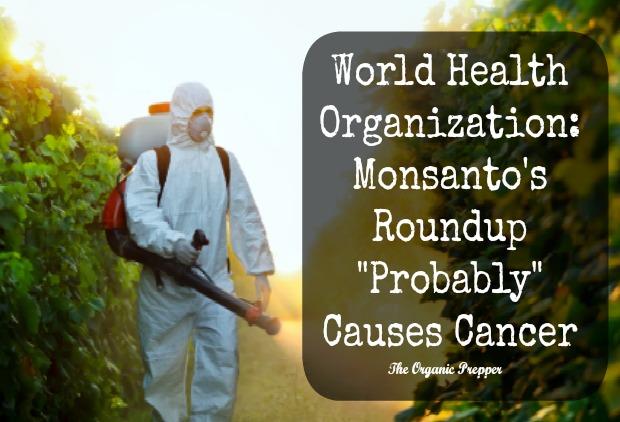If you're new here, you may want to subscribe to my RSS feed. Thanks for visiting!
By Daisy Luther
The WHO has issued a damning pronouncement about the world’s largest seed company:
Glyphosate, the primary ingredient in Monsanto’s toxic Round-up herbicide, is “probably carcinogenic.”
The announcement comes after a report was published by the International Agency for Research on Cancer in a British medical journal. The agency cited numerous studies in which occupational exposure to glyphosate was linked to “increased risks for non-Hodgkin lymphoma”.
The Wall Street Journal reported:
“The assessment followed a meeting this month among 17 experts representing 11 countries, who evaluated the cancer-causing potential of glyphosate and four other pesticides. The research agency, which hasn’t previously classified glyphosate, monitors global cancer cases while trying to identify causes and responses.”
Monsanto, unsurprisingly, disagrees with the assessment. Phillip Miller, the Vice President of what is possibly the most hated company in the world, responded to the WHO’s announcement:
“We don’t know how IARC could reach a conclusion that is such a dramatic departure from the conclusion reached by all regulatory agencies around the globe.”
Other studies concur that Round-up is deadly
Actually, it isn’t just the IARC that has reached such a conclusion. I guess VP Miller missed it, but last year, two major, peer-reviewed studies offered proof that glyphosate is deadly.
The first study found that glyphosate increases the breast cancer cell proliferation in the parts-per-trillion range.
An alarming new study, accepted for publication in the journal Food and Chemical Toxicology last month, indicates that glyphosate, the world’s most widely used herbicide due to its widespread use in genetically engineered agriculture, is capable of driving estrogen receptor mediated breast cancer cell proliferation within the infinitesimal parts per trillion concentration range.
The study, titled, “Glyphosate induces human breast cancer cells growth via estrogen receptors,” compared the effect of glyphosate on hormone-dependent and hormone-independent breast cancer cell lines, finding that glyphosate stimulates hormone-dependent cancer cell lines in what the study authors describe as “low and environmentally relevant concentrations.”
Another study found that consumption of glyphosate causes intestinal and gut damage, which opens the door to numerous human diseases, such as diabetes, gastrointestinal disorders, heart disease, obesity, autism, Parkinson’s and Alzheimer’s
However, another classification of allergy-type food is emerging and getting recognized for adverse effects on the human intestinal tract and gut. Those foods are genetically modified organisms known as GMOs or GEs. There is scientific research indicating intestinal damage from GMO food and the article “Glyphosate’s Suppression of Cytochrome P450 Enzymes and Amino Acid Biosynthesis by the Gut Microbiome: Pathways to Modern Disease” discusses how the inordinate amount of pesticides sprayed on GMOs leaves residues in GMO crops that, in turn, are being traced to modern diseases. (source)
Monsanto’s stocks are falling
Monsanto’s stock has fallen more than 3% since the WHO’s announcement. Let’s spread this information far and wide and hope that stocks continue to fall for the company.
Further reading:
Monsanto vs. the World: The Monsanto Protection Act, GMOs and Our Genetically Modified Future
Food Plague: Could our daily bread be our most life threatening exposure?
Banned: A History of Pesticides and the Science of Toxicology















